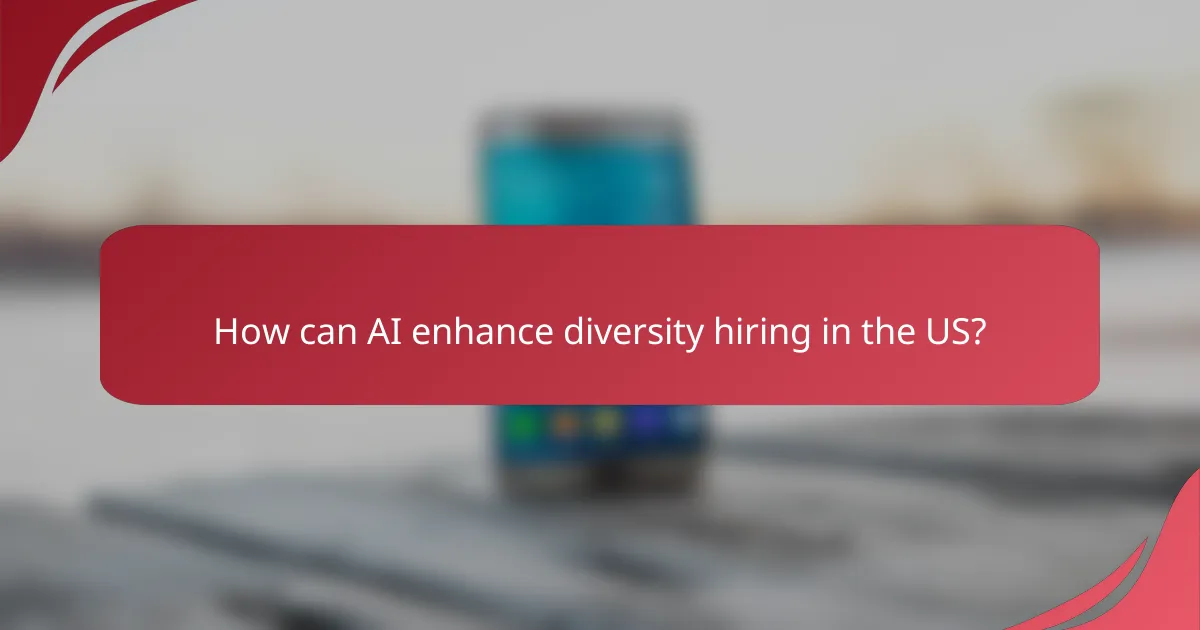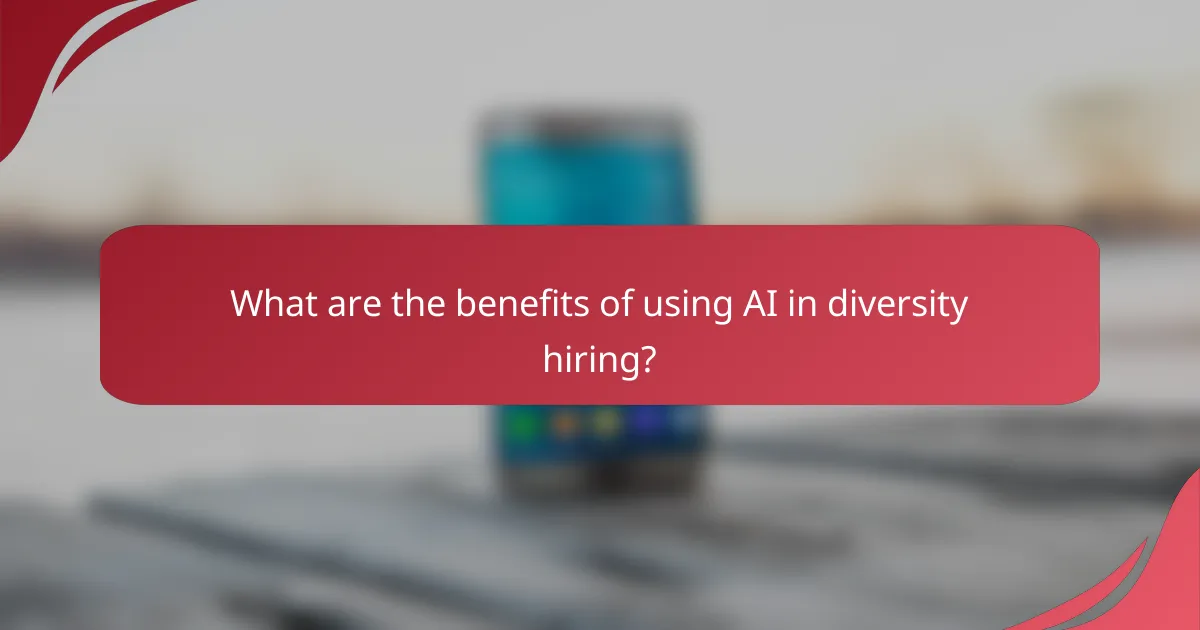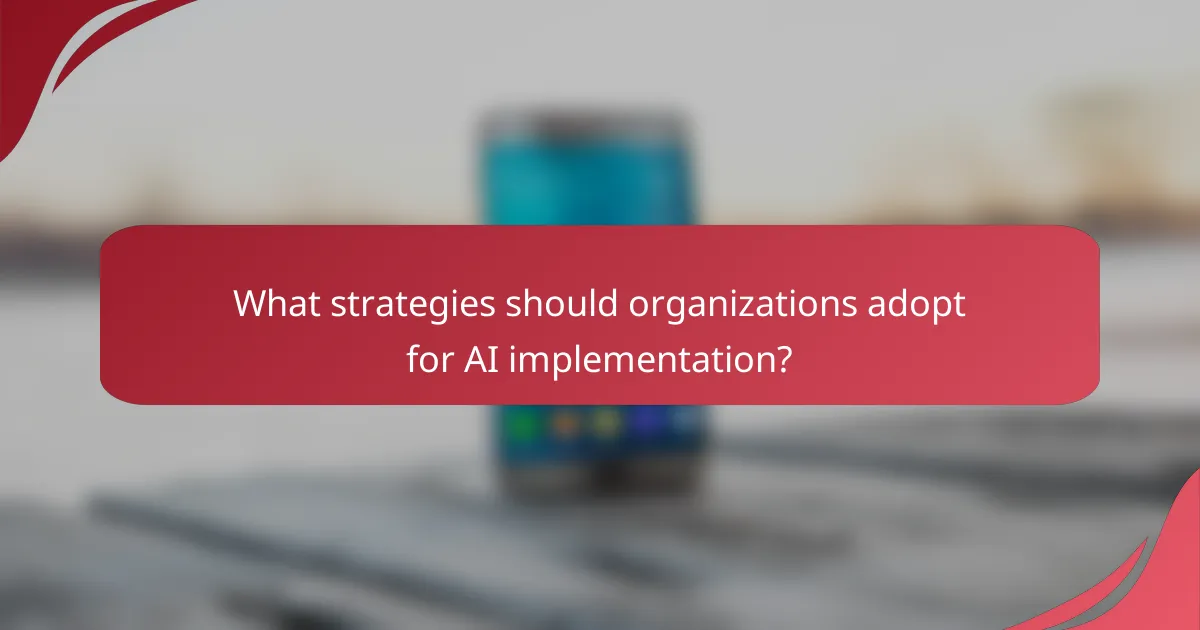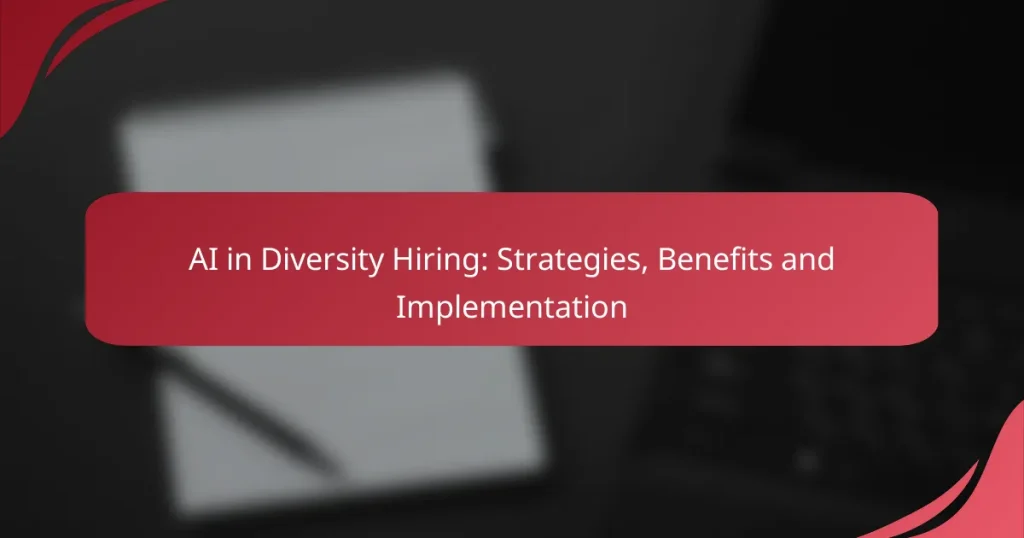Integrating AI into diversity hiring practices can transform the recruitment landscape by reducing biases and enhancing efficiency. By utilizing advanced technologies, organizations can attract a more diverse candidate pool and make informed hiring decisions. A structured implementation approach is essential, focusing on clear diversity goals and continuous monitoring to ensure the effectiveness of AI in fostering an inclusive workforce.

How can AI enhance diversity hiring in the US?
AI can significantly improve diversity hiring in the US by streamlining processes and minimizing biases. By leveraging advanced technologies, organizations can create a more inclusive recruitment strategy that attracts a wider range of candidates.
Automated resume screening
Automated resume screening uses AI algorithms to quickly assess applications based on predefined criteria. This technology can filter out unqualified candidates while ensuring that diverse backgrounds are considered, thus promoting inclusivity.
Employers should set clear criteria that align with their diversity goals. Regularly updating these criteria can help maintain relevance and effectiveness in attracting diverse talent.
Bias reduction algorithms
Bias reduction algorithms are designed to identify and mitigate unconscious biases in hiring processes. These algorithms analyze language and patterns in job descriptions and candidate profiles to promote equitable evaluations.
To implement these algorithms effectively, companies should continuously monitor their outcomes and adjust parameters as needed. This iterative process helps ensure that diversity goals are met without compromising on quality.
Diversity analytics tools
Diversity analytics tools provide insights into the demographics of applicants and hires, helping organizations track their diversity initiatives. These tools can reveal trends and gaps in hiring practices, enabling data-driven decisions.
Employers should regularly review analytics reports to identify areas for improvement. Setting specific diversity targets based on these insights can enhance accountability and progress.
Candidate sourcing platforms
Candidate sourcing platforms leverage AI to identify and reach out to diverse talent pools. These platforms can connect employers with underrepresented groups, broadening the scope of potential candidates.
When using these platforms, companies should ensure that their outreach efforts are genuine and tailored to resonate with diverse communities. Building relationships with organizations that support underrepresented groups can also enhance sourcing efforts.
Interview scheduling software
Interview scheduling software automates the coordination of interviews, reducing administrative burdens and allowing for a more streamlined process. This can help ensure that diverse candidates are not overlooked due to scheduling conflicts.
Employers should choose software that allows for flexibility in scheduling to accommodate candidates from various backgrounds. Providing options for virtual interviews can further enhance accessibility and inclusivity in the hiring process.

What are the benefits of using AI in diversity hiring?
AI in diversity hiring offers several advantages, including a broader candidate pool, improved efficiency in the hiring process, better decision-making, and valuable data-driven insights. These benefits help organizations create a more inclusive workforce while streamlining their recruitment efforts.
Improved candidate pool diversity
AI tools can analyze resumes and applications without bias, focusing solely on qualifications and skills. This leads to a more diverse candidate pool, as AI can identify talent from underrepresented groups that might otherwise be overlooked. By using AI, companies can enhance their outreach and attract a wider range of applicants.
Employers can implement AI-driven platforms that source candidates from various backgrounds, ensuring a more equitable hiring process. For example, using algorithms that prioritize diverse experiences can help organizations meet diversity goals effectively.
Increased hiring efficiency
AI can significantly reduce the time spent on the hiring process by automating repetitive tasks such as resume screening and initial candidate assessments. This efficiency allows hiring managers to focus on more strategic aspects of recruitment. Many organizations report a reduction in time-to-hire by as much as 30-50% when integrating AI solutions.
Additionally, AI can help prioritize candidates based on fit and potential, streamlining the selection process. This leads to quicker decisions and a more agile hiring strategy, which is crucial in competitive job markets.
Enhanced decision-making
AI provides data-driven recommendations that can enhance decision-making in hiring. By analyzing past hiring data and candidate performance, AI can identify patterns that lead to successful hires. This helps organizations make informed choices based on objective criteria rather than subjective opinions.
Moreover, AI can assist in reducing unconscious bias by providing insights into hiring trends and outcomes. Organizations can use these insights to refine their hiring practices and ensure they align with diversity objectives.
Data-driven insights
AI tools generate valuable analytics that can inform diversity hiring strategies. By tracking metrics such as applicant demographics and hiring success rates, organizations can identify gaps and areas for improvement. This data allows for continuous refinement of recruitment strategies to better meet diversity goals.
Furthermore, regular analysis of AI-generated reports can help organizations stay compliant with diversity regulations and standards. By leveraging these insights, companies can proactively address potential issues and enhance their overall diversity initiatives.

What strategies should organizations adopt for AI implementation?
Organizations should adopt a structured approach to AI implementation that focuses on setting clear diversity goals, selecting appropriate AI tools, training hiring teams, and monitoring outcomes. This strategy ensures that AI contributes effectively to enhancing diversity in hiring processes.
Define diversity goals
Establishing clear diversity goals is essential for guiding AI implementation in hiring. Organizations should identify specific metrics, such as increasing the representation of underrepresented groups by a certain percentage within a defined timeframe.
For example, a company might aim to increase the number of women in technical roles by 20% over the next two years. These goals should be measurable and aligned with the overall business objectives to ensure accountability.
Choose the right AI tools
Selecting the appropriate AI tools is crucial for achieving diversity goals. Organizations should evaluate AI solutions that are designed to reduce bias in recruitment processes, such as those that anonymize resumes or use algorithms to assess candidates based on skills rather than demographic factors.
It’s important to consider tools that comply with local regulations regarding hiring practices. For instance, in the EU, organizations must ensure that their AI tools adhere to the General Data Protection Regulation (GDPR) to protect candidate data.
Train hiring teams
Training hiring teams on the use of AI tools and the importance of diversity is vital for successful implementation. Teams should understand how to interpret AI-generated insights and integrate them into their decision-making processes.
Workshops and ongoing training sessions can help hiring managers recognize potential biases and leverage AI effectively. This training should emphasize the value of diverse perspectives in fostering innovation and improving company culture.
Monitor outcomes
Regularly monitoring outcomes is essential to assess the effectiveness of AI in achieving diversity goals. Organizations should track key performance indicators, such as the diversity of candidate pools and the success rates of hires from different backgrounds.
Establishing a feedback loop allows organizations to make necessary adjustments to their AI tools and hiring strategies. This continuous evaluation helps ensure that the AI implementation remains aligned with the evolving diversity objectives of the organization.

What are the challenges of AI in diversity hiring?
AI in diversity hiring faces several challenges that can hinder its effectiveness. Key issues include data privacy concerns and algorithmic bias risks, both of which can undermine the integrity and fairness of the hiring process.
Data privacy concerns
Data privacy is a significant challenge when implementing AI in diversity hiring. Organizations must ensure that personal information collected during the hiring process complies with regulations such as GDPR in Europe or CCPA in California. Failing to protect candidate data can lead to legal repercussions and damage to the company’s reputation.
To mitigate these concerns, companies should adopt transparent data practices. This includes informing candidates about how their data will be used and ensuring that data storage and processing comply with relevant legal standards. Regular audits of data handling practices can help maintain compliance and build trust with candidates.
Algorithmic bias risks
Algorithmic bias poses a serious risk in AI-driven diversity hiring, as biased training data can lead to unfair hiring decisions. If an AI system is trained on historical hiring data that reflects existing biases, it may perpetuate those biases, disadvantaging certain groups of candidates. This can result in a lack of diversity and inclusivity in the workforce.
To address algorithmic bias, organizations should regularly evaluate and update their AI models. Implementing diverse training datasets and conducting bias audits can help identify and correct any biases present in the algorithms. Additionally, involving diverse teams in the development and testing of AI systems can provide valuable perspectives and reduce the risk of bias.


